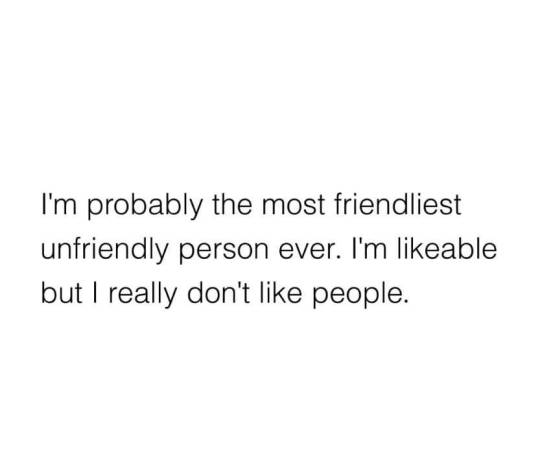#likeable*
Text




On Being Socially Accepted / Well Liked
Human beings are sociable animals. No matter the degree of sociability, there’s a part of us that wants to be loved, nurtured and accepted by those around us.
I didn’t want to make a guide of how one should be likeable, because if you think a little - from all the people you like, do you like them for the same reason? Not necessarily. You may like one friend for their humour; another for being a solid person thick and thin; a third for their extroverted personality… we’re all different and should be!
Now, you may have certain qualities that you want in all your relationships, regardless of the person. For instance, I’m very adamant about transparency and loyalty. Loyalty to me doesn’t mean standing up for me even if I’m wrong - it means caring for me enough to tell me I’m wrong. However, these qualities wouldn’t make you likeable per se - they would make you accepted within a social circle.
So how does one become likeable?
1. Ease up on the doormat culture
You’ll notice that most of the people you like are capable of having an independent opinion and thought. People pleasers may come across as inauthentic and dicey, especially the ones who change their opinion to agree with the majority. So start cutting out the people pleasing behaviour.
2. Have hobbies
You’ll generally gravitate more towards someone who seems to have their life together as opposed to someone who doesn’t. I’m always keen to talk to someone who does something a little different in their free time. I remember talking to a physicist who also wrote poetry - I was very intrigued by his work, and I invited him to my NYE party along with his girlfriend.
Now, there’s nothing wrong with not having your life together as long as you’re at least trying to make it better. Hobbies don’t have to be expensive. It’s also a better way to expand your circle- not all your friends will enjoy pottery or tennis, for instance.
3. On emotional/ trauma dumping
The worst people to guide you in life, my father always told me, are your friends. Blind leading the blind.
Your friends may have a good heart but not necessarily good advice. Keep the trauma dumping to a minimal unless your friend is okay with you sharing more. Bear in mind that even as a listener, when you hear someone’s traumatic experiences, you may feel emotionally overwhelmed.
Never share your private experiences, current situations, drama, problems, gossip with acquaintances or friends who you’re not particularly close to. Trust me, it can be tempting to engage in catty behaviour but there’s a good chance it’ll bite you in the ass.
4. Figure out your strengths
I know what I bring to the table when it comes to friendship - gentle honesty, alternative solutions and perspectives to issues and I’m always a planner.
One of my friends is a blunt critic and I always speak to her when I know I need a reality check about life.
Another friend is very non judgemental, she’s the one I open up to about the weird things I think of.
A third friend is my party friend, who is 100% the life of the party and I love his energy.
We can’t share the same relationship with everyone. Understand your strengths and hone them.
5. Likeable people don’t care about being likeable
Become detached from this idea of “I want to be liked.” Rather than that, I feel the statement “I want relationships who accept me for who I am” make more sense. As you grow older, you’ll realise that this teenager definition of popularity is nothing but inauthentic bullshit. You deserve friends who care for you and cheer you on.
The idea of “I want to be liked/ popular” also low-key reeks of desperate behaviour. It shows that you don’t really care about your thoughts or opinions as long as you’re accepted and you’re ready to modify your opinions to fit in. That’s the worst way to making friends because you literally can’t be yourself.
6. Yes, looks do matter
Looks do matter to a degree. I don’t mean that in a sense of physical features - I mean it from a sense of grooming.
I’ve noticed that people will be taken more seriously if you look a certain way. That doesn’t mean you have to buy stuff until your money runs out - it just means being at a healthy weight, dressing well, practicing personal hygiene.
7. Observational skills
Whenever I’m at an event and I notice someone feeling left out, I go and talk to them.
I remember being in the shoes long ago and feeling uncomfortable going to places. So when I see someone in the same position, I try to be the person I wanted at that point of time.
It’s important to have keen observation skills but what’s even more important is dealing with it subtly. I remember a girl at a party wearing a dress with the price tag still attached to the neckline at the back. I casually went over, put a hand on her back, discreetly whispered that her tag was out, should I put it back in? She said yes, and I put the the tag inside her dress without people around us noticing me. Discretion is a must in life. Don’t shout your good deeds- do them, don’t get flattered by compliments when people tell you that you were nice, and just play it off like it’s not a big deal.
8. Being impolite
I read a study that polite people are harder to connect with. Overly polite people can be seen as boring and that you need more energy to talk to them because the conversation only revolves around a few “polite” topics (studies, career, life in general, how nice the establishment is, the weather, common friends… surface conversation). I’m not saying don’t be considerate - I’m saying don’t be overly polite. Don’t be over accommodating to other people. You can disagree with things respectfully. You can share a different perspective or crack a joke.
9. What are you like?
Are you better one on one or in groups?
I’m a much better person one on one. I resonate with people better when we have a conversation - when it’s a group, it’s just the usual hi-hellos.
You may prefer groups, if one on one conversations seem too vulnerable.
How do you figure this trait out? Ask yourself a simple question : if you had a meet a new person, would you rather meet them alone at a cafe or at a party with your friends?
Figuring this out is important because it gives you a sense of the relationships you value and how you can take them forward.
10. A balanced ratio of talking and listening
Try to listen more than you can talk. This advice is useless if you’re talking to an introvert. With most introverts I’ve noticed that they WILL talk to you - as long as they don’t have to make the first move. Once you set the ball rolling, they’re happy to talk.
So you have to understand how and when to switch being an active listener and speaker.
A simple generalised guide:
When dealing with extroverts: ask basic/ generic/ yes or no questions, give opposing opinions (most extroverts are generally up for a challenge) and listen more in the beginning, switch to talking more later.
When dealing with introverts: again, ask questions but you can make them more subjective than objective, less generic and definitely no yes/no questions. Talk more in the beginning and then listen more later, to make them comfortable.
#c suite#powerful woman#ceo aesthetic#personal growth#that girl#productivity#strong women#getting your life together#feminine energy#balance#on being likeable#likeable#popular#friends#making friends#authentic friendship#dealing with personalities#personalities#introvert#extrovert#queen b
1K notes
·
View notes
Note
You did manage to show G's charm!! It's just a small moment but that scene in the penthouse where G replies "maybe you just weren't memorable enough" to being teased about forgetting MC's name but then looks at MC and says something like "no, that's not true"? The ease with which they say it. Ngl, just that one line did something to me lmaoo
I was proud of that one lmao and yay! g is so cool sometimes but also so pathetic (affectionate)
#inbox#it's so hard writing g sometimes because how do i make someone charming#likeable#and unlikeable (for vic) all at once#g reign#infamous spoilers
186 notes
·
View notes
Text

Sparkstember Day 21: 'We were the ones who they voted most likeable'
#Ron Mael#Sparkstember#Sparkstember 2024#Sparks Band#Sparks#Likeable#Exotic Creatures of the Deep#2008
21 notes
·
View notes
Text
Now I am quietly waiting for the catastrophe
of my personality to seem beautiful again,
and interesting, and modern.
— Frank O'Hara, from "Mayakovsky" in "Meditations in an Emergency" (Grove Press, 1957) (via Regina Rosenfeld)
14 notes
·
View notes
Text



Take a moment every day to look around you and feel the colors, enjoy the colors.
#shinozaki ai#morimatea#teapot#teacup#tea#teatime#beautiful#shinoglaze#teapotcollector#fine art#enjoy it#likeable#quiet morning#relaxtime#tealoversunite#ancient ways#charming#teaforlife#joyfulmoments
26 notes
·
View notes
Text

Let's put things in perspective now and then...
Source: Dr. Seerut K Chawla Instagram Page
#self help#seerut chawla#self esteem#mental health#philosophy#healing#relationship#not good enough#emotions#grief#loneliness#pain#acceptance#approval#likeable
8 notes
·
View notes
Text
Damn all of you ...
Look at what you assholes did.
LOOK AT IT!
Democratically elected cute and likeable by a 71% majority!
I even asked for an ugly and unlikeable sweep! It's tumblr poll rules that you're supposed to sweep the posted option! But no, now I'm just officially cute. Can't say I'm not until the next vote in 4 YEARS!!
Gonna have to edit my stupid blog description...
#trans#transgender#talisidekick#talisidekick things#cute#democratically elected cute and likeable#likeable#2slgbtqia+#lgbtqia+#lgbtq+#lgbt+
8 notes
·
View notes
Note
Hi, ENTJ here. I am 24. I have read a lot of books on the subject of communication, being liked, etc. I have many long-standing strong friendships, but I don't feel that I am likeable in a group. I feel that I do great in a relationship with another person if it's been going on a while and if it's 1-1. I also have the impression that most of the books and your posts are about 1-1 communication, maybe incorrectly. How could I learn to function in groups? Will I ever be able function as Fe user?
Your question is too vague. Relationship dynamics, group dynamics, and communication skills are three separate and very broad subjects in psychology, so there are many ways to approach them, depending on the issue you want to address. I need to know which angle you're approaching them from. You haven't even specified whether you're talking about personal or professional situations. It's not very useful to say you've read a lot of books because they could be terrible books for all I know. Explain why you felt compelled to study this. Describe the issues or problems you wanted to address. Specify what kinds of groups you are concerned with. Provide an illustrative example of how you performed poorly in a group.
What are your strengths and weaknesses in communication? Most people don't realize they're bad at communicating until they run into a practical problem or get negative feedback. The majority of the questions I get from readers are about intimate relationships, family relationships, or difficult work situations, so the book recommendations reflect these common concerns. While most of the cases happen to be 1-1 communication, the basic principles outlined in the books are also very applicable to group communication.
Group communication isn't as common as 1-1, so it doesn't get as much attention. But you are correct in suspecting that there are important differences between them. Some factors to be aware of:
I. Complexity
What makes a "group" different than a mere collection of individuals? It may help to think of a group as a system made up of parts. In systems thinking, understanding the parts is not enough to understand the whole, because the whole is a bigger and brand new level of process. Even if you were to have good 1-1 communications with every member of a group at the individual level, it doesn't necessarily help you understand what's really going on at the larger group level.
Groups are much more complex for a variety of reasons. In purely practical terms, you are exposed to a lot more information. In a 1-1 encounter, you only have to monitor one relationship. It's taxing enough to attend to all the feelings, needs, and preferences of two people, and then try to steer the relationship dynamic in a positive direction. In a five person group, there are 10 relationships to monitor. And a 20 member group? 190. (Please check my math because it's not my strong suit, lol.)
The larger the group, the more complex, because the number of interactions increases exponentially with each additional person involved. Thus, it's easy to get overwhelmed in a group just based on the sheer amount of information there is to process in real-time. Most people don't have any theoretical understanding of groups, so they can only try their best to cope with information overload through: selective attention, being more passive or more aggressive, or remaining oblivious.
If you want to communicate well in a group, it's not enough to just work on your personal communication skills. Compare how you speak with a stranger versus how you speak with a spouse. Do you adjust the way you communicate based on who you're talking to? There should be a lot more going on, psychologically, when you speak to someone you're very close to. Analogously, in a group, there's a lot going on at the group level and you need to be aware of it in order to navigate it effectively.
The study of groups is interdisciplinary, touched upon in fields like: interpersonal psychology, organizational psychology, sports psychology, sociology, anthropology, education, political science, criminology. Since I don't know your angle, you can look up books about "group dynamics", "group process", "teamwork", or "community building" if you're interested in fortifying your theoretical knowledge. (I've added two book recommendations to the resources list for anyone interested: 1) Small Group and Team Communication, and 2) Group Dynamics.)
For ENTJs to learn well, they have to establish a proper balance between theory (Ni) and practice (Se), rather than leaning too heavily toward one or the other. As a general note, loop prone ENTJs tend to be resistant to theory because they don't have the patience to work out the complexities of how to apply it properly. They want communication to be as simple and straightforward as they imagine it could be. Unfortunately, reality is more nuanced and complicated.
II. Content vs Process
To be a good communicator, you have to be capable of paying attention to two different aspects of meaning:
The content is concrete and straightforward. It refers directly to what is being communicated about.
The process is abstract and more difficult to define and interpret. It refers to "indirect" things such as: how the communication is going; how the communication is being experienced; what is being implied; what is being assumed; what the relational dynamic is; what is affecting the relational dynamic and why; etc. In the case of groups: the status of group cohesion; whether group goals are being met; whether group strengths are being realized; whether group weaknesses are being addressed; whether individual members are participating properly; etc.
Ts who haven't learned good communication skills tend to focus exclusively on the content of what is being said and only respond to that. They tend to be more blind to the "human" (for lack of a better word) side of communication that happens "between the lines".
A very simple example: You asked a colleague "How are you?" and they replied with "I'm fine". Do you just go with the content and believe the literal meaning of the words? Or do you take time to notice things like: their unsmiling facial expression, the almost imperceptible sigh at the end of the sentence, how their vocal pitch rose to imply that there's more to the story (which invites you to probe further)?
Cognitive functions aren't skills, so don't confuse cognitive processing with cognitive abilities. I suppose you mention Fe because of its facility for tapping into people's feelings and emotions. But it isn't necessary to have Fe to socialize well. Oftentimes, all you have to do is open your eyes and ears, as with the above example. The majority of communication is nonverbal, so learn to read facial expressions and body language as strong clues. Beware that wanting to become/imitate another personality type has the potential to harm your psychological well-being if it leads you to devalue your type or lose self-esteem (aka "type envy"). There's more than one way to do things and it's important you find the way that works best for you, by honoring the gifts of your own type and using them to find the right gateway into learning a skill.
It may be useful for Te to think of speech as an "action". When you communicate, you're "doing" something to the people receiving the message. This raises the question of what exactly you're doing and what are the effects/consequences? In a group, this is not straightforward to figure out, because different people may perceive you differently. Some people may agree with you, some may disagree, some may feel threatened, some may be indifferent. If you were to care deeply about how every member of the group perceives you, you might get overwhelmed and become paralyzed. It's not a good goal to aim for.
The best you can do is make clear your intent (i.e. what you want your speech to "do") and then try to express your meaning as clearly as possible, which requires some facility with language. You need to have a good understanding of the words you're using, but not just the dictionary meaning, also the common connotations. You can pick up connotations naturally by exposing yourself to a wide variety of people, which is why I always advocate for interacting with people from all walks of life. You'll get firsthand experience of how words are used somewhat differently in different contexts (and thus produce different effects/consequences).
The meaning of words isn't determined by you but by how they are generally used within a group/culture, so it's best to acknowledge any deficits in your understanding of what words really mean, with all their possible connotations. You should also be open to feedback about how people react to your communication style. If they have any difficulty understanding you, investigate and learn better ways to express your meaning.
For ENTJs, the willingness to look beneath the surface comes with proper Ni development, which includes probing deeper into what people say, as well as knowing the deeper meaning of language. Healthy Ni ought to care about whether there is a mismatch between one's perception of reality and reality itself. When there's a mismatch between what you intended to express and how it actually came out into the world, use Ni to explore why. Ni lends you the patience and curiosity to get to the truth/essence of the matter, which should help you learn how to say what you mean in the best possible way.
III. Shared Meaning and Purpose
When you're part of a group, you're part of something larger than yourself, so your thinking must broaden beyond the personal. Think about what the group needs/wants, what the group aims to do, and what keeps the group together. There are many different kinds of groups. Sometimes, you have no choice but to be part of a group. Sometimes, you choose to join a group for your personal needs. Sometimes, you happen to find yourself in a group that needs to accomplish a temporary mission. What kind of group(s) are you referring to?
In order for a group to function well, there has to be a sense of fairness, especially in terms of how roles and responsibilities are divided up among members. E.g.: A group should not have too many freeloaders who take more than they contribute, otherwise resentment could boil over. A group should not be too hierarchical in over/undervaluing certain roles and tasks, otherwise prejudice or jealousy might fuel infighting. A group should not concentrate power in too few hands because it enables antisocial, controlling, and exploitative behavior.
Reflect on what you bring to the table and how you contribute to the group's purpose. What roles do you commonly take on in groups, and why? How do the other members perceive your contributions? When you speak, do you make reference to the group's purpose enough?
In a previous post, I mentioned how meaning-making is important for bonding people together. Similarly, for a collection of individuals to transform into a cohesive group, they have to develop a sense of shared meaning. The majority of the members have to care about the group as a whole and whether members are properly aligned with the group's purpose, otherwise, the bonds holding the group together start to weaken and dissolve. This is why groups naturally do things such as: draw up rules for everyone to follow; demarcate a boundary between in-group and out-group; dress in uniforms; use identifying symbols; repeat and rehash inside jokes; require individuals to make symbolic gestures to affirm/prove their group membership. When you speak, do your words contribute something to shared meaning?
IV. Identity & Identification
Your description is unclear but it sounds like you don't know how to express who you are in a group setting? You mention "likeable", so why is it important for you to be likeable? Do you think it makes it easier for you to be heard or belong? Do you hope to have some influence on the other members? Do you hope that being likeable in the group is a shortcut to forming good relationships with each individual? In other words, what is your motivation for being a well-liked member of the group?
What it means to be a "likeable" person is dependent on context. What seems likeable to one group might seem unlikable to another. For example, imagine standing up to speak to a right-wing political group versus a left-wing political group. One of the reasons why politicians seem dishonest or two-faced is because they have to change how they communicate depending on who they're talking to.
One thing you can do to appear more likeable is appeal to the group's shared values. Why are you part of the group in the first place? What characteristics, traits, beliefs, or opinions do you share with the group? Whatever they are, it's important to reinforce them openly enough to make the other members feel as though you belong there.
One common challenge people experience in groups is not being able to resolve the tension between individuality and conformity. On one hand, you want to fit in and feel a sense of belonging. On the other hand, you don't want to completely lose yourself to the group. A lot of people are suspicious of "belonging" because they've seen how groups can quickly escalate into cultish or destructive behavior.
Ideally, a healthy group should make space for individuals to express who they really are, in order to maximize opportunities for all members to contribute something special to the group's success.
However, the debate about where the boundary lies between self and group assumes that someone is already fitting in. The more primary concern is whether you're even capable of fitting in when you want to. This issue is sometimes related to identity and can manifest in two different ways, either "too much" or "too little".
In the case of "too much", identity is often multi-faceted and some people feel as though they can't fit in when the group doesn't affirm all the important aspects of their identity. For instance, it's not always easy existing as the only man/woman/nonbinary person in the group (gender identity), or existing as the only person of a specific race, culture, religion, or ethnicity in the group. When you feel as though there is an important part of you that the rest of the group can't see and/or can't understand, it's hard to feel like a full member. If they don't really know all the things that make you who you are, then do they really like you, or do they just like their own 2D image of you? In order to fit in better, is there something about you that feels unseen or unacknowledged by the group that you perhaps need to express more visibly?
In the case of "too little", some people have trouble fitting in because their identity lacks substance and they have nothing with which to carve out a niche for themselves. Perhaps they don't know themselves very well. Perhaps they have no strong beliefs, opinions, feelings, or passions. Perhaps they have no personal interests or hobbies. If you want to be likeable, people have to find an easy and interesting way to share in your existence. If there's nothing remarkable about you for them to label as "the thing you are known for" within the group, then it's hard for them to connect with you, which makes it hard for you to feel fully embraced.
There are pros and cons to having a strong sense of identity. Not having one means you are less prone to feeling hurt by invalidation. However, it also means that people might see you as "lacking personality" or "hard to relate to". Some ENTJs struggle to define their identity due to inferior Fi. In general, EJs exist out there in the world and don't put much attention and energy into constructing a personal identity. Perhaps they define themselves by their goals or by the job/work/roles that they perform in society. While these aspects of identity are legitimate, they are largely external. One also requires an internal sense of identity, created and nurtured from the inside out - a process aided by introverted function development.
Perhaps, like many Te doms, you believe a person is defined by how "useful" they can be, and you don't understand the utility of a personal identity. But a lot of people can make themselves useful by working on their competencies. It doesn't necessarily make them likeable, though they may get admired. What makes you a unique person? Is there something about your existence that people can really enjoy and appreciate as uniquely you?
#entj#auxiliary ni#inferior fi#communication#groups#group communication#group dynamics#fitting in#likeable#likeability#identity#identity issues#individuality#relationships#ask
9 notes
·
View notes
Text

👻
2 notes
·
View notes
Text
are you water because ur making me wet
#hahahhaah#heehee#smart#funny#likeable#pickup#pickup lines#pickupline#pick up line#pick up lines#pickuplines#pickup line#pick#up#line#love#love in the air#lovelove#lovelovvelovelove#romance#im sorry
8 notes
·
View notes
Photo

SUPER HANS https://www.artpal.com/G-Art?i=256318-307 #SuperHans #PeepShow #CharacterArt #SmartDressed #WideEyed #CrazyHair #SupermarketArt #Catchphrase #TheSecretIngredientIsCrime #Excitement #Adventure #RiskTaker #Likeable #Charming #Inspiring #BoldImagery #BrightColors #UniquePerspective #PowerfulImage #ArtLovers #TVShowArt #PopCultureArt (at Manchester, United Kingdom) https://www.instagram.com/p/CoMmT2XtifY/?igshid=NGJjMDIxMWI=
#superhans#peepshow#characterart#smartdressed#wideeyed#crazyhair#supermarketart#catchphrase#thesecretingredientiscrime#excitement#adventure#risktaker#likeable#charming#inspiring#boldimagery#brightcolors#uniqueperspective#powerfulimage#artlovers#tvshowart#popcultureart
2 notes
·
View notes
Text
If you don't like me anyways, does it really matter what I do? Why should I bother to try?
#heartache#spilled ink#spilled thoughts#mental health#mental illness#spilled words#leave me alone#likeable#action#try#why try#why try so hard
1 note
·
View note
Text
Here the confirmation of this Twitter account named, “JavxMLover1044”

0 notes
Text

0 notes
Text
Happy Amok Time Day, friendly reminder that Theodore Sturgeon, the writer of the episode, is credited with the first positive portrayal of homosexuality in science fiction with his short story The World Well Lost (1953), 14 years before Amok Time aired. Which could mean nothing.
#please read it tho it’s online and it’s soooo good#heartbreaking.#devastating.#but incredible#and a very quick read too#it’s also funny because like. the characters are very similar to Kirk and Spock just like less likeable versions#which again. could mean nothing.#anyhow I think it adds a very neat layer to amok time#star trek#spirk#tos#amok time#the world well lost#theodore sturgeon#sci fi
3K notes
·
View notes
Text
DUDE the minecraft movie trailer pisses me the FUCK OFFFF DUDE IT LOOKS SO BAD 😭😭😭😭 this is why minecraft story mode is PEAK everyone should play mcsm 💚💚💚it’s the best Minecraft movie yall will get that isn’t that live action slop with jack black🙏🔥🔥
Anyways I’m reallyyy upset that the mc movie is going to be LIVE ACTION of all things.. the movie being live action just takes away the entire charm of Minecraft it just doesn’t WORK in my opinion and it sucks that we have two really good Minecraft 3d animation styles to work off of 💔💔


I’ve said this so many times but a 3d Minecraft movie would have just worked so much better??? Especially looking at some of the amazing 3d animated movies we’ve gotten in the last couple years
#Minecraft#mcsm#minecraft story mode#cosmic rambling#Minecraft movie#also I just don’t like Jack black and the characters from the mc movie trailer don’t seem that likeable…😭
4K notes
·
View notes